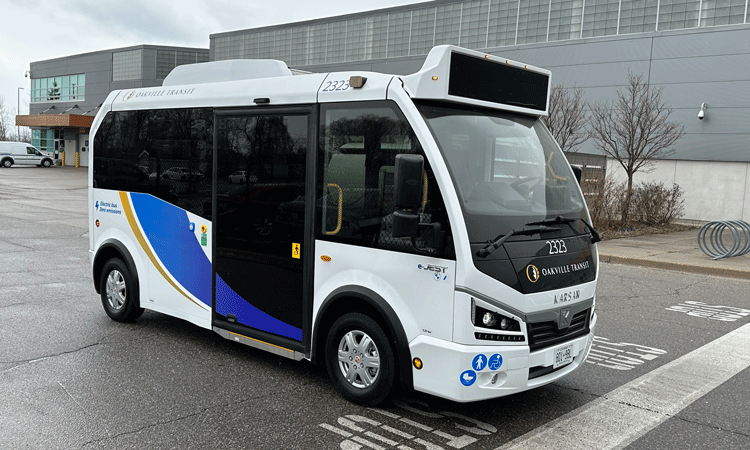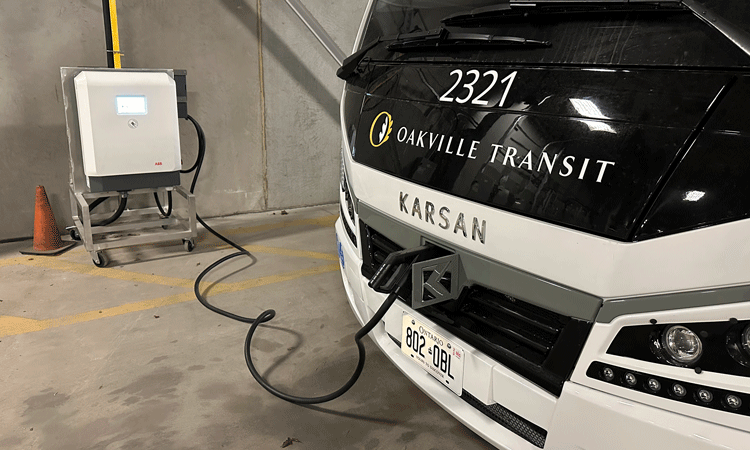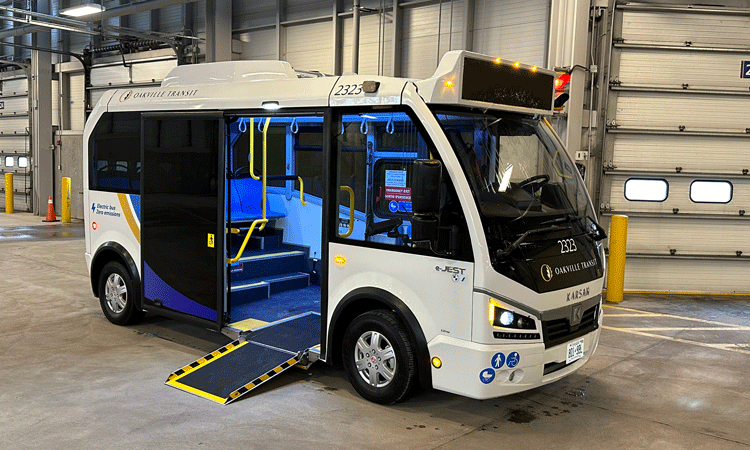Pioneering sustainable and innovative transit solutions
- Like
- Digg
- Del
- Tumblr
- VKontakte
- Buffer
- Love This
- Odnoklassniki
- Meneame
- Blogger
- Amazon
- Yahoo Mail
- Gmail
- AOL
- Newsvine
- HackerNews
- Evernote
- MySpace
- Mail.ru
- Viadeo
- Line
- Comments
- Yummly
- SMS
- Viber
- Telegram
- Subscribe
- Skype
- Facebook Messenger
- Kakao
- LiveJournal
- Yammer
- Edgar
- Fintel
- Mix
- Instapaper
- Copy Link
Posted: 31 August 2023 | Joanne Phoenix - Oakville Transit | No comments yet
Joanne Phoenix, Manager of Planning and Administrative Services at Oakville Transit, discusses the future of sustainable transit initiatives in Oakville, including the electrification of its bus fleet and the implementation of innovative technologies to enhance service delivery for customers.


Oakville, Ontario, Canada, is located on the north shore of Lake Ontario, midway between Toronto and Hamilton, with a population of 231,000 residents. Founded in 1857, Oakville has become one of the most coveted residential and business centres in Ontario, thanks to great neighbourhoods, places to do business, quality schools, convenient access to local highways and transit, and more; providing all of the advantages of a well-serviced urban centre, while maintaining a small-town feel.
Oakville Transit operates conventional fixed-route, on-demand and specialised transit services, delivered through a fleet of 102 conventional and 24 on-demand and specialised buses”
Since 1972, the town’s public transportation system, Oakville Transit, has been helping residents to get to where they need to be through convenient and efficient service. 50 years ago, service was introduced with 10 new buses, five routes across town with a 20-minute schedule frequency, with 300 bus stops and 31 drivers.
Today, Oakville Transit operates conventional fixed-route, on-demand and specialised transit services, delivered through a fleet of 102 conventional and 24 on-demand and specialised buses. The overall system includes 22 local routes and eight school specials (serving high schools in the community), with 1,137 bus stops. In 2022, Oakville Transit saw over 2.5 million boardings.
As Oakville Transit continues to evolve, one key area of focus in the coming years is the electrification of our entire transit fleet, with a huge step toward this goal achieved in early 2023 with the arrival of our first 15 zero-emission battery electric buses (BEBs).
The future of Oakville Transit: Greening transit initiatives
The future of transit in Oakville is focused on service delivery that is modern, sustainable and innovative; continuing to meet the needs of our costumers today while supporting growth for the future”
The future of transit in Oakville is focused on service delivery that is modern, sustainable and innovative; continuing to meet the needs of our customers today while supporting growth for the future.
In 2020, the Town of Oakville announced a seven‑year plan to purchase 60 electric buses with joint funding from the Government of Canada, the Government of Ontario and the Town of Oakville. The planned electrification of Oakville Transit’s fleet is a long-term, multi-year strategy that will require both energy and infrastructure to support the Investing in Canada Infrastructure Program-funded BEBs and the projected energy and capacity requirements for full fleet electrification.
In addition, Oakville Transit completed an Electric Bus Needs Assessment plan to identify the charging infrastructure that is required to support the integration of fully electric buses into its fleet. The study included a review of existing facility resources, required changes and an assessment of on-street requirements (range and on-street charging). Discussions with utility companies were also a critical component of the assessment to determine what would be required to build, operate and maintain the energy infrastructure for the bus facility in the coming years.
A significant milestone on the path to transit fleet electrification was celebrated on 23 February 2023. Oakville Transit was joined by Oakville Mayor Rob Burton and town councillors, as well as our local federal and provincial government representatives, to celebrate the arrival of our first-ever zero-emission, smaller capacity BEBs, driving the town towards the goal of environmentally friendly and sustainable transit solutions to reduce our carbon footprint.
“The unveiling of Oakville Transit’s first-ever electric buses is an important milestone in advancing council’s efforts to create a thriving and liveable Oakville for today and future generations. Reducing the town’s greenhouse gas emissions and overall environmental footprint, while modernising and expanding our transit services, is critical to the health and wellbeing of our community,” said Mayor Burton during his remarks at the event. “Thanks to funding from the town and our federal and provincial partners through the Investing in Canada Infrastructure Program, we’re moving forward to provide innovative and environmentally friendly transit service for Oakville.”


New electric bus plugged into charging station.
Manufactured by Karsan, the 20-foot e-Jest model buses will be used to deliver transit services such as care-A-van, Home to Hub and Ride On-Demand (in North and South East Oakville). To support battery charging for these electric buses, 10 charging stations have also been installed at Oakville Transit’s operations facility. This first batch of electric buses – 15 in total – will all be in service in 2023.
Transitioning to a zero-emission propulsion system will have a significant positive impact on the town’s corporate goal to reduce GHG emissions”
Oakville Transit buses travel more than six million kilometres annually. Diesel fuel is the single largest source of greenhouse gas (GHG) emissions from the town’s operations. Thus, transitioning to a zero-emission propulsion system will have a significant positive impact on the town’s corporate goal to reduce GHG emissions. This transition not only supports Oakville town council’s unanimous Climate Change Emergency declaration, but also the town’s Environmental Sustainability Strategy, Climate Change Strategy, Community Energy Strategy and Sustainable Green Fleet Procurement, and is one of seven key priority projects for Oakville Transit to address climate change, ease gridlock and improve connectivity.
Battery electric buses are a green technology with the potential for zero emissions from energy generation through to bus operations. Electric buses have no tailpipe emissions and, in Ontario, generation of electricity for overnight charging is virtually free of GHG emissions. The absence of tailpipe emissions also means that bus idling would no longer be an environmental concern. Furthermore, the operation of a BEB virtually eliminates the noise that is often associated with the operation of a bus.
The town has been active in implementing climate change policies and programmes since 2005 and has taken significant steps to reduce its impact on the environment. In June 2019, the town council unanimously passed a motion declaring a climate emergency in Oakville, establishing the importance of accelerating climate change action. The town had already taken steps to prepare for a changing transit fleet in 2011, when Oakville Transit moved into a newly constructed facility and bus garage and service centre.
Coming soon!
The town is also on track to acquire zero-emission BEBs to be used for conventional services (larger capacity buses operating on fixed-routes) in early 2024. This will require additional co-ordination and work in energy delivery, storage, redundancy and charging to support Oakville Transit’s transition to BEBs.
Alterations to the facility to support electrification are planned in three phases:
- Phase 1 identifies using excess energy capacity at Oakville Transit’s garage (plug in chargers)
- Phase 2 includes facility upgrade and pantograph chargers
- Phase 3 continues BEB procurement and final facility upgrade (full garage electrification).
The expansion of the existing transit garage will also occur during this transition, constructing new energy infrastructure and additional bus lanes at the same time, resulting in construction cost efficiencies.
With the first phase of our multi-year strategy to transition to a fully electric bus fleet underway, it is an exciting time for Oakville Transit and the community overall, as we usher in a new era of public transit service delivery for Oakville.


© Jan Boic/ Oakville Transit
A snapshot of Oakville Transit
Currently, our conventional transit services operate within the urban boundaries of the town for a total service area of approximately 140km2, with critical cross boundary connections in place with Burlington Transit to the West and MiWay (Mississauga Transit) to the East. In addition, Oakville Transit connects with Metrolinx regional rail system, GO Transit’s Lakeshore West Train service, at four different stations: Bronte GO Station, Oakville GO Station, Clarkson GO Station (Mississauga) and Appleby GO Station (Burlington). Connection with GO Transit bus services is also in place at these same stations, with additional connections occurring at the GO Transit Carpool lots at Dundas Street / Highway 407 and Trafalgar Road / Highway 407.
Oakville Transit is also responsible for the operation of a specialised transit service known as care-A-van, a door-to-door transportation service for persons with disabilities who are unable to use conventional transit services. The service is operated by smaller capacity buses, and cross boundary transfers are available with Burlington Handi-van and Peel Transit Help.
Home to Hub is an on-demand service offering which picks customers up at the end of their driveways and transfers them to the closest transit hub, where they can connect to fixed-route service to continue their journey. Currently, on-demand service is available in neighbourhoods in North and South East Oakville.


Related topics
Air Quality, Fleet Management & Maintenance, Infrastructure & Urban Planning, Public Transport, Sustainable Urban Transport
Issue
Issue 2 2023
Related modes
Bus & Coach
Related countries
Canada
Related organisations
Oakville Transit
Related people
Joanne Phoenix








